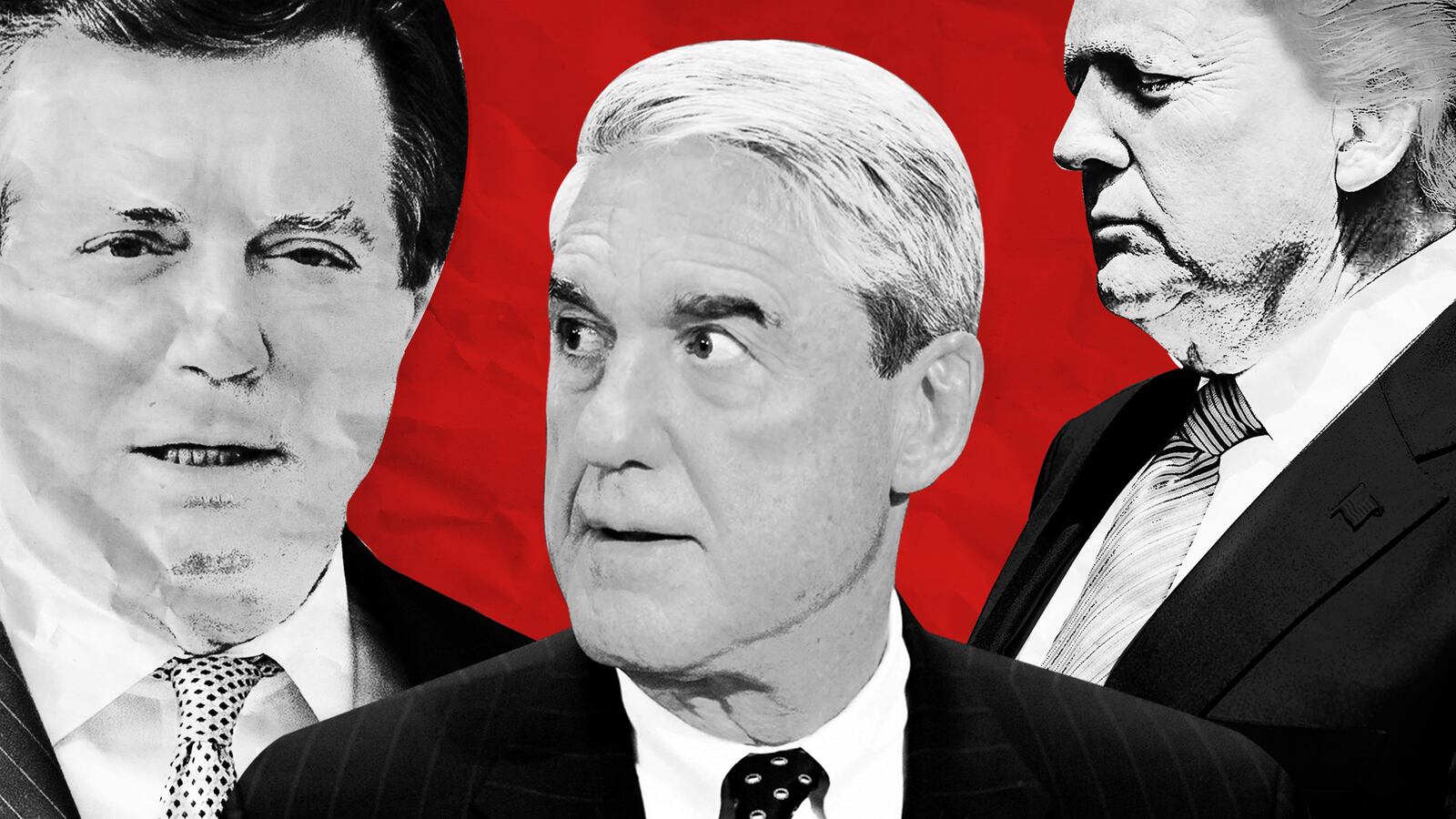On Friday morning, Donald Trump’s former campaign chairman Paul Manafort pleaded guilty in federal court in Washington, D.C. to two counts of conspiracy relating to his work as an unregistered agent for pro-Russian Ukrainian politicians, among other crimes. Manafort pleaded guilty not via a straight plea agreement—where both sides give a little, cut their losses, and go their separate ways—but, stunningly, with a cooperation agreement. Paul Manafort’s cooperation agreement with special counsel Robert Mueller is an existential threat to the Trump presidency.
During Friday’s plea proceeding, Mueller’s deputy Andrew Weissman stated on the record that Manafort already has proffered with Mueller’s team. That means that, at a minimum, the process of downloading information from Manafort has begun, and presumably has gotten far enough along that Mueller felt comfortable making a deal with Manafort.
Of course, now that he has pleaded guilty and agreed to be sentenced for all of his criminal conduct, Manafort now has to actually cooperate with Mueller. That means, in essence, that Mueller now owns Manafort. Manafort has to do everything Mueller asks: provide information to investigators upon request, testify in the grand jury, turn over documents to Mueller, and testify at trial. If Manafort is truly on board as a cooperator, then Mueller knows, or soon will know, everything Manafort knows. That must be a scary thought for the president.
Indeed, Manafort seems uniquely positioned to deliver extraordinary—perhaps even historic—cooperation. Manafort is situated differently than the other cooperators who have given information to Mueller thus far. Manafort sat in the inner sanctum of Trump world, while prior cooperators like former campaign official Rick Gates and former campaign adviser George Papadopoulos were more like B-listers. Ex-National Security Advisor Michael Flynn and ex-Trump lawyer Michael Cohen (who, according to recent reporting, may be speaking with Mueller as well) both had insider access to Trump.
But Manafort looks to have been Trump’s primary conduit to Russia, while Flynn had more limited Russian contacts and Cohen dealt more with Trump’s local and domestic finances. Of all the people in Trump’s orbit, the one who most likely has information about a possible conspiracy with the Russian government—aside from Vladimir Putin himself—is Paul Manafort.
If we were at the proffer table with Manafort, we’d start with the June 2016 Trump Tower meeting, which a team of Russian emissaries set up by offering Donald Trump Jr. “dirt” on Hillary Clinton. (Junior’s infamous reply: “If it’s what you say I love it especially later in the summer.”) How did the meeting come about? Were there any internal pre-meetings to prepare for the Russians? Did anyone tell Trump about the meeting before it happened? Who was involved in crafting the public statement claiming that the meeting was mostly about adoptions? Why did the Trump team feel the need to lie to the public about the meeting afterwards? Note that the president is not the only person who will lose sleep tonight. The two other campaign officials in the Trump Tower meeting, Trump, Jr. and Jared Kushner, might want to go have a talk with their attorneys tomorrow morning as well.
Beyond the Trump Tower meeting, we’d delve into the many strange circumstances around Manafort’s work for the Trump campaign. Why and how did Manafort, who owed millions of dollars to Russian oligarch Oleg Deripaska, come to work as Trump’s campaign chair for no salary? How did Manafort plan to profit from his position with Trump? What did Trump know about Manafort’s prior foreign lobbying work when he hired Manafort? Why did the Republican campaign platform change after Manafort came on board, including by changing its stance to oppose providing arms to anti-Russian Ukrainian forces? Manafort should be able to answer these questions and more.
Surely in the coming days we will hear from the chorus of Trump surrogates who will attack Manafort specifically (funny how Trump is all full of love for his cronies until they flip on him, after which they become scoundrels) and cooperators generally, claiming that cooperators commonly lie to please prosecutors. In our experience as federal prosecutors—collectively spanning hundreds of cases and dozens of trials—that is simply not so. First, prosecutors have no interest in enlisting a lying cooperator, and do so only at their own risk. The proffer process itself is largely an exercise in testing the cooperator’s veracity and in determining whether the cooperator’s testimony is corroborated by other, independent evidence including e-mails, phone records, financial records and other hard evidence. Moreover, the ultimate determination about a cooperator’s veracity is made by the trial jury, and the vast majority of federal criminal trials end in conviction.
Looming over all of this is the possibility that Trump could pardon Manafort. As audacious as Trump can be, we do not expect him to take this precipitous step, at least not in the near future (particularly with midterm elections just weeks away). Given the timing, and given the revelation that Manafort is now cooperating, a pardon would at once ignite a political furor and also would smack flagrantly of obstruction of justice. Why pardon Manafort only now that it has become known that he is cooperating? Moreover, a pardon might not even suffice to shut Manafort up. Manafort still could face state charges in the event of a presidential pardon. In that case, successful cooperation with the feds would still help Manfort and would accrue to Manafort’s sentencing benefit even in front of a state judge (prosecutors typically agree to bring a subject’s cooperation to the attention of any judge, at any level; we have submitted letters for federal cooperators who faced sentencing in state and local courts as well).
Manafort’s cooperation could change everything. He had close access to Trump, and his knowledge should go not merely to collateral matters but right to the heart of Russian conspiracy with Trump and his campaign. The closest members of Trump’s inner circle and family now face genuine danger of criminal indictment, and Mueller may even have the evidence to implicate the president in a crime, or at least to make a strong recommendation of impeachment to Congress. To be fair, perhaps Manafort doesn’t have the goods on Trump, or can’t directly implicate him in Russian election interference. Either way, we will know soon enough whether Trump’s oft-repeated cry of “no collusion” is reality, or the final delusional gasp from a deeply troubled president.







